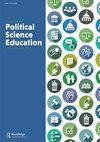融入学生学习:IR理论的音乐
IF 0.6
Q3 POLITICAL SCIENCE
引用次数: 0
摘要
国际关系理论(IR)通常是学生难以理解的话题:它们是什么?它们如何有用?对于那些可能从未上过政治学课、不是政治学专业、就读于农村地区大学、与世界接触有限的学生来说,情况尤其如此。那么,作为教师,我们如何使IR理论更贴近学生和他们的日常生活呢?打开音乐!作为创新的新学习框架的一部分,世界政治导论课程的学生被要求确定他们最喜欢的音乐家中哪一位体现了国际关系的四种主要理论(现实主义、自由主义、建构主义和女权主义)。然后,学生们被要求解释他们最认同的理论是什么,以及基于他们的音乐选择的原因。他们还被要求把其他理论想象成音乐家,以帮助他们提高对IR理论的理解。我们发现利用音乐作为教学工具来教授国际关系理论对非政治学专业的大一和大二学生有净的积极影响。本文章由计算机程序翻译,如有差异,请以英文原文为准。
Tuning into Student Learning: The Music of IR Theories
Abstract The theories of international relations (IR) are often difficult topics for students to understand: What are these and how are they useful? This is especially true among students who have likely never taken a political science class, are not political science majors, and are attending a rural regional university with limited exposure to the world. So, how do we, as instructors, make IR theories more relatable to students and their daily lives? Cue the music! As part of an innovative new learning arc framework, students in sections of the Intro to World Politics course were asked to identify which of their favorite musicians embody the four main theories of IR (realism, liberalism, constructivism, and feminism). Students were then asked to explain what theories they identified the most with and why based on their music choices. They were also asked to imagine other theories as musicians as a way to help them improve their understanding of IR theories. We find that utilizing music as a pedagogical tool to teach IR theories has a net positive impact especially on freshmen and sophomore students whose major is not political science.
求助全文
通过发布文献求助,成功后即可免费获取论文全文。
去求助
来源期刊

Journal of Political Science Education
POLITICAL SCIENCE-
CiteScore
1.80
自引率
36.40%
发文量
69
期刊介绍:
The Journal of Political Science Education is an intellectually rigorous, path-breaking, agenda-setting journal that publishes the highest quality scholarship on teaching and pedagogical issues in political science. The journal aims to represent the full range of questions, issues and approaches regarding political science education, including teaching-related issues, methods and techniques, learning/teaching activities and devices, educational assessment in political science, graduate education, and curriculum development. In particular, the journal''s Editors welcome studies that reflect the scholarship of teaching and learning, or works that would be informative and/or of practical use to the readers of the Journal of Political Science Education , and address topics in an empirical way, making use of the techniques that political scientists use in their own substantive research.
 求助内容:
求助内容: 应助结果提醒方式:
应助结果提醒方式:


